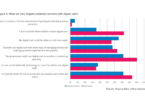You won’t hear many central banks encourage depositors to switch their money from bank accounts to money market funds. But that’s what the Bank of Israel did two years ago when banks were slow to pass on higher interest rates to their depositors. Part of the problem was that the banks quickly and fully passed on the higher rates to borrowers. In a speech yesterday, Andrew Abir, Deputy Governor of the Bank of Israel, said he hoped that a central bank digital currency (CBDC) might spur more bank competition.
If there’s a decision to issue a digital shekel, that will likely attract a certain amount of funds away from banks. Hence, Mr Abir hopes that a CBDC will encourage banks to offer better deposit rates. If banks don’t respond, then the Bank of Israel will have a cattle prod that most other central banks don’t possess: its CBDC design allows it to offer interest on the digital shekel. From Mr Abir’s comments, it doesn’t plan to use it immediately.
However, if banks don’t pass on interest rate changes to customers, an interest-bearing digital shekel means the central bank won’t purely manage monetary policy in an indirect manner. It will have a direct route to depositors. In other words, it can change the interest rate on the digital shekel to encourage banks to respond. Mr Abir acknowledged that this would have to be done carefully.
When the Bank of Israel published its digital shekel design last month, we noted that it was less bank friendly in another critical way. Many CBDCs use banks as intermediaries. By providing the wallet and the on- and off-ramp to the CBDC, banks can maintain some control over their client relationship. The Bank of Israel is encouraging other providers to compete, so bank funded topups will happen from non-bank wallets.
As part of its push to encourage greater competition, the central bank has launched a CBDC sandbox enabling API access for fintechs. This is inspired by a similar BIS and UK initiative, Project Rosalind.
Mr Abir’s message was very clear. If the Bank of Israel decides to launch a digital shekel, encouraging competition will be a major motivation.






